Chocolate cake, or “sjokoladekake”, is the cake that is the most popular cake in Norway today and what inspired today’s recipe and blog post. Norwegians simply can’t seem to get enough chocolate, in fact, Norwegians eat more chocolate than their Scandinavian neighbors in Sweden, Denmark, and Finland. Every Norwegian eats about 9.5 kilos (about 21 lbs) of chocolate per year if we are to believe a study published a couple of years back. The Swiss, unsurprisingly, top the list with the highest consumption, followed closely by Ireland, England, Austria, Belgium, and Germany.
Chocolate first arrived in Norway sometime during the 18th century, when a merchant in Trondheim put an advert in the newspaper that read: “a kind of medicinal chocolate, which will help your stomach, chest, is good for healing coughs, gets rid of dizziness, clears phlegm and encourages fulfillment of marital duties.” The last one cracked me up!
Although chocolate was initially released on the market as a medicinal food, it quickly became a luxury product for the urban elite. In the beginning, the market for chocolate was really small, even as chocolate factories popped up all over Europe. People were slowly gaining larger disposable incomes, but in order to increase their market share, chocolate producers needed to get creative with naming their products.
By the turn of the century, Norway was in the process of becoming independent from Sweden and was seeking its own identity. In a time largely influenced by the romantic period, it was memories of the golden age and references to Norwegian nature that appealed to the masses. The new products were named “Jarlen” (the Earl), “Bispen” (the Bishop), Fjeldsæter (mountain farm), and Prillar Guri (read more about her here).
But as people’s taste for and consumption of chocolate increased, discussions arose as to whether chocolate was healthy or not. In 1922, the government discussed imposing a “luxury tax” on chocolate, because chocolate was concluded to be damaging for the teeth and people’s health in general. A tax of 33.33% was imposed on chocolate (10% for baking chocolate), and as a result, chocolate went from “healthy” to “sinful”.
During this time, Norway went through hard economical times, and the chocolate industry was hit hard. They started promoting chocolate as some of the cheapest, most calorie-dense nourishment a child could give her child!
In a time when many went hungry, it was important to consume enough calories, and the commercials showed mothers with healthy-looking, chocolate-eating children. Simultaneously, chocolate maintained its luxury status, as seen in the many confectionary boxes (konfektesker) with many names of royals on the lids:
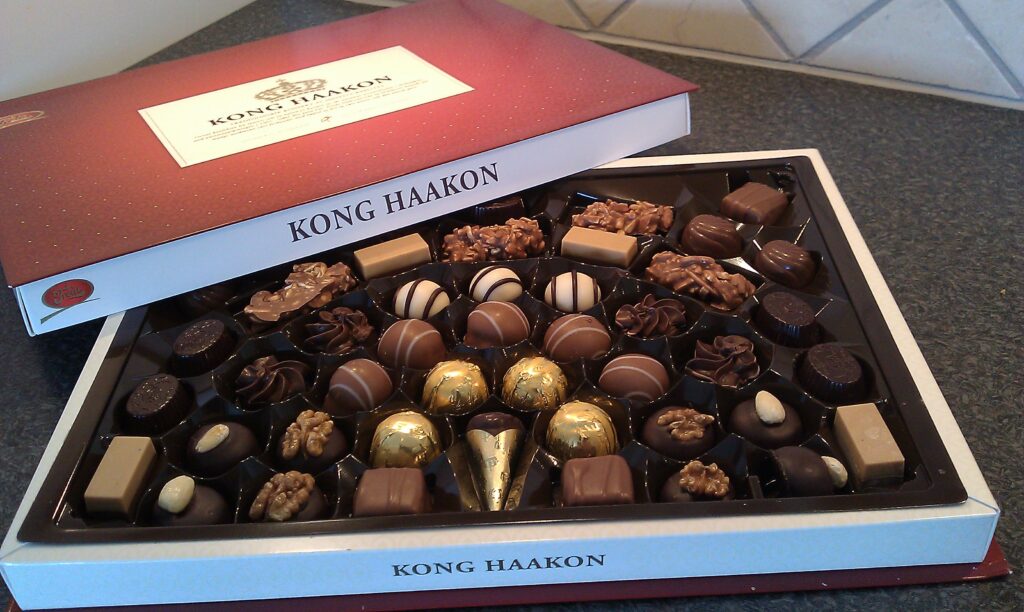
In the 1930s, the chocolate industry started targeting men as well, to increase their market reach. “Hjemmekos” (our word for the Danish term “hygge”, basically having a cozy time at home), wasn’t something that appealed to men, but going for outdoor hikes and being out in nature, on the other hand, became a sort of status symbol for men. This most Norwegian of all phenomena was not common before the turn of the century. People didn’t have the time or the money to go on hiking trips, as this was something associated with the wealthy and having money. But with time, people’s financial status slowly improved.
Going hiking and being in nature now became commonplace, and the motto “Ut på tur, aldri sur” (literally translated to ‘out hiking, never in a bad mood’), became popular, as chocolate was always included in people’s backpacks as part of an easy, nutritious “niste” (packed lunch) when they went out in nature. In one of their commercials, big chocolate producer Nidar said that “big packed lunches are impractical and completely unnecessary baggage. A few bars of chocolate in your pocket takes up no space at all”.
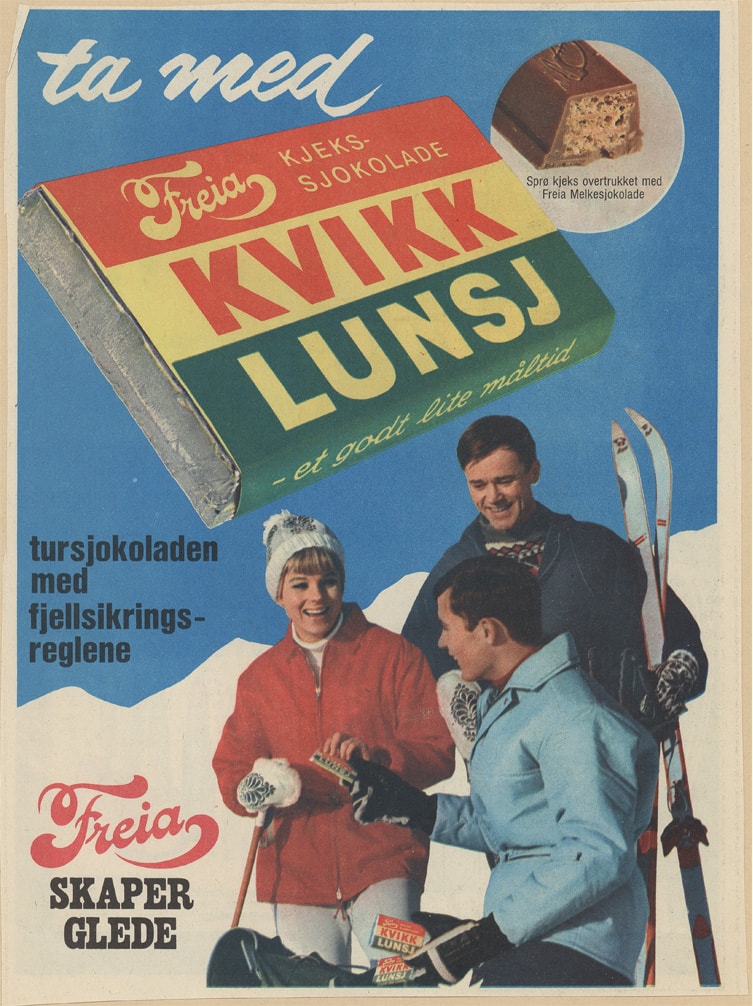
To this day, no Norwegian forgets to pack their chocolate bars when going skiing or hiking. Roald Amundsen, the famous Norwegian explorer of polar regions, took part in commercials for both Freia and Nidar: symbol of a real Norwegian man who fought the tough nature!”
From poor mothers feeding their children, royals, and celebrities to polar heroes – we can see it’s not so much the chocolate that has changed, but the situations and society around it.
Even today, Norwegians prefer their own chocolate; produced right in their own homeland. Brands such as Nidar and Freya are most popular, but there are now a ton of local artisan producers of chocolate, one of them is “Fjordnær”, a gorgeous chocolate made in the gorgeous Geiranger fjord:
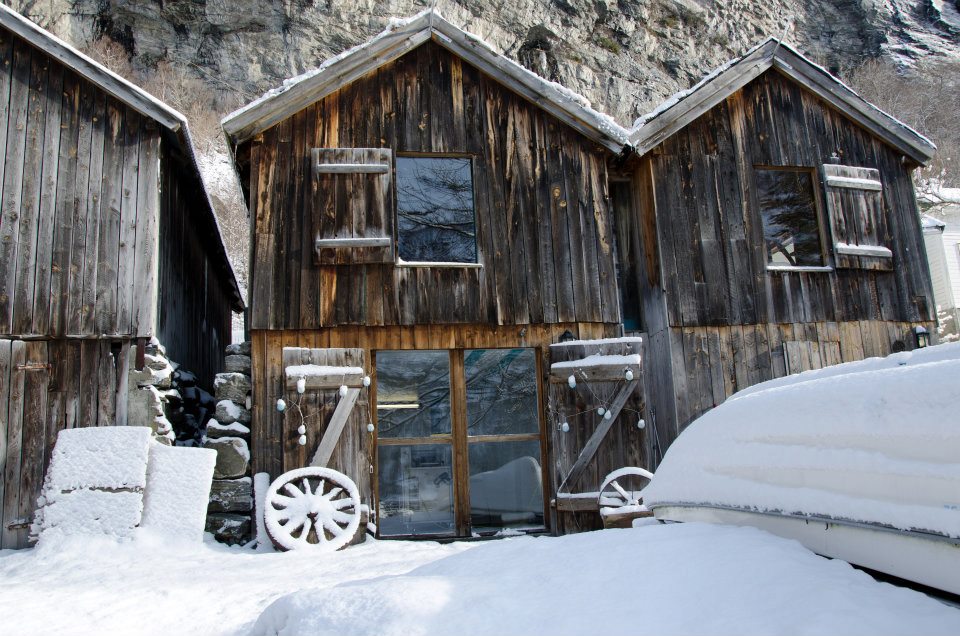
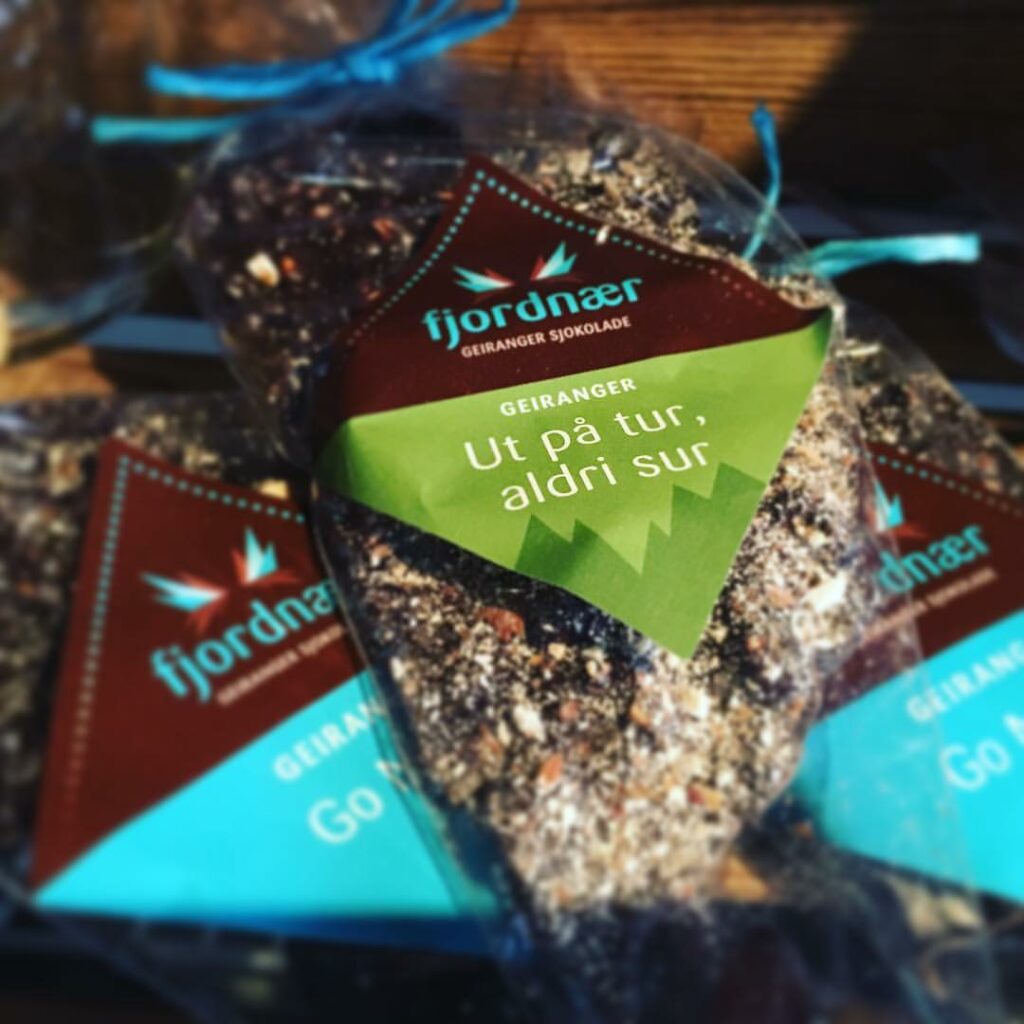
Norwegians are fairly conservative in their taste, a recent study shows that 40% of people like and stick to the same chocolate they ate as children. Milk chocolate is the predominant go-to type for Norwegians (Freia’s “melkesjokolade” is king here), and older, traditional brands are the most popular. Typically a clean chocolate with not too much fuss is preferred.
While I love to cover traditional foods from Norway, I also want to shed some light on what is actually being eaten, cooked, and baked in Norway today. Like I mentioned earlier, chocolate as a product has not changed, but the way it is enjoyed changes with the evolvement of time. As the world is becoming smaller and smaller with the internet and people traveling more, we see increased popularity in particularly American food in modern Norway.
Brownies have to be some of the most popular international pastries made by Norwegians today, particularly among kids and younger people. Since I’ve already covered sjokoladekake in a previous blog post which you can read here, I wanted to pay tribute to my adopted homeland and post a recipe for brownies made entirely without eggs or dairy to show you how decadent and similar pastries can be without the use of these animal products.
This is a cake that can be whipped up in minutes and is guaranteed to be a hit with anyone you serve it for.
Use whatever chocolate you have on hand. Despite being Norwegian, I prefer dark over milk chocolate (also I no longer consume cow’s milk), and that is what I used in my recipe.
Happy baking and don’t forget to brush your teeth after you indulge, because you never know! 🙂
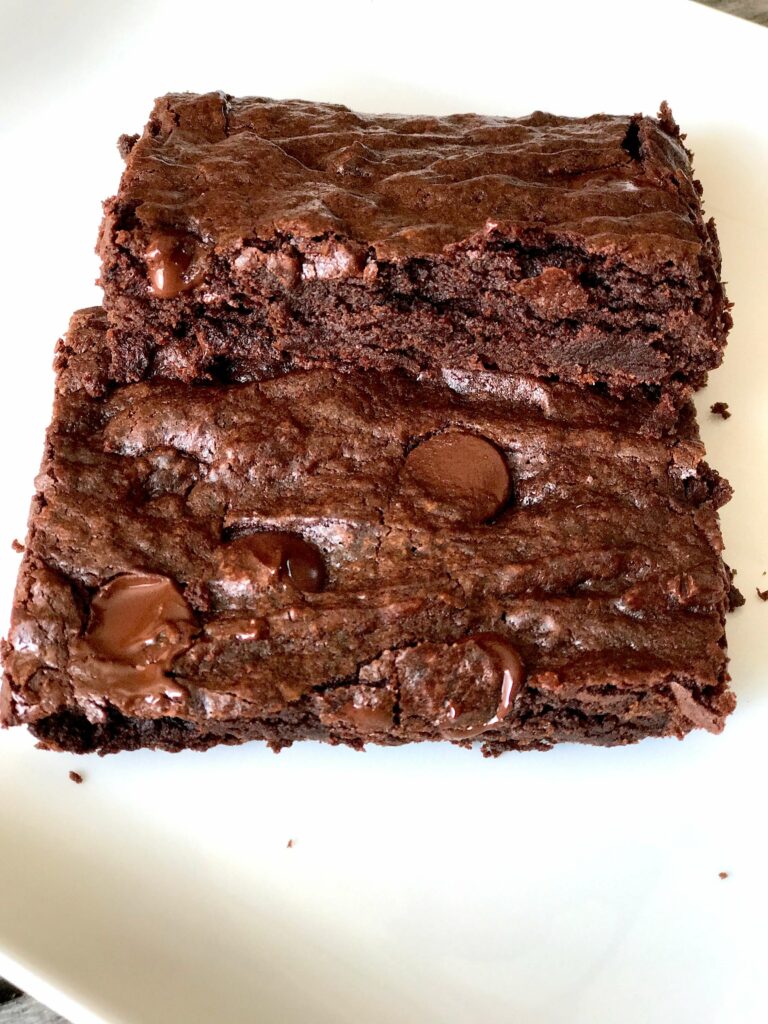
DECADENT VEGAN BROWNIES
1/4 cup natural almond butter
heaping 1/2 cup dark brown sugar
1/2 cup maple syrup
1/3 cup melted coconut oil
1/2 cup (packed) unsweetened cocoa powder
1 tsp vanilla extract
1/4 tsp salt
2 flax eggs (2 tbsp ground flaxseeds mixed with 6 tbsp water)
1/4 cup plus 2 tbsp all-purpose flour
1/2 cup dark chocolate chips
Preheat oven to 325° Fahrenheit (165° Celcius).
Line an 8 X 8 brownie pan with parchment paper and set aside.
In a medium bowl, combine almond butter, brown sugar, maple syrup, and melted coconut bowl with a whisk. Whisk until you have a nice, smooth mixture.
Add cocoa powder slowly in, while whisking, making sure no lumps are left. Add in the vanilla extract and salt, then the flax eggs. Switch from a whisk to a spatula and lastly add the flour, before folding in the chocolate chips.
Pour the batter into the pan and bake for about 25 minutes or so. Cool for about an hour before slicing and devouring!
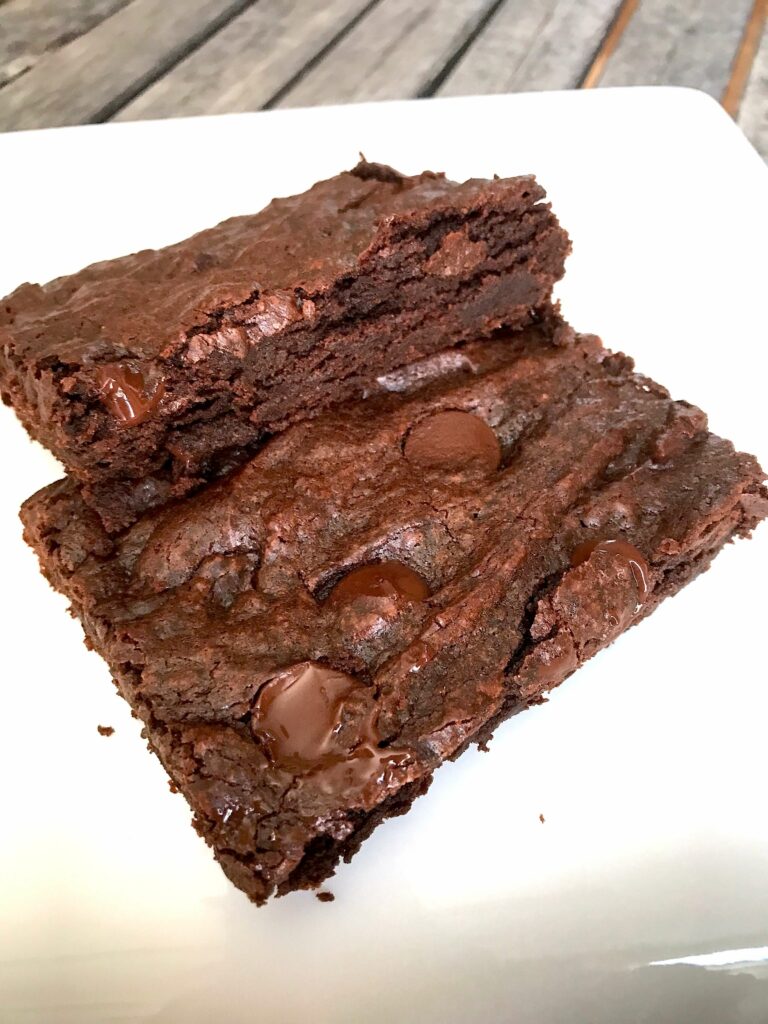
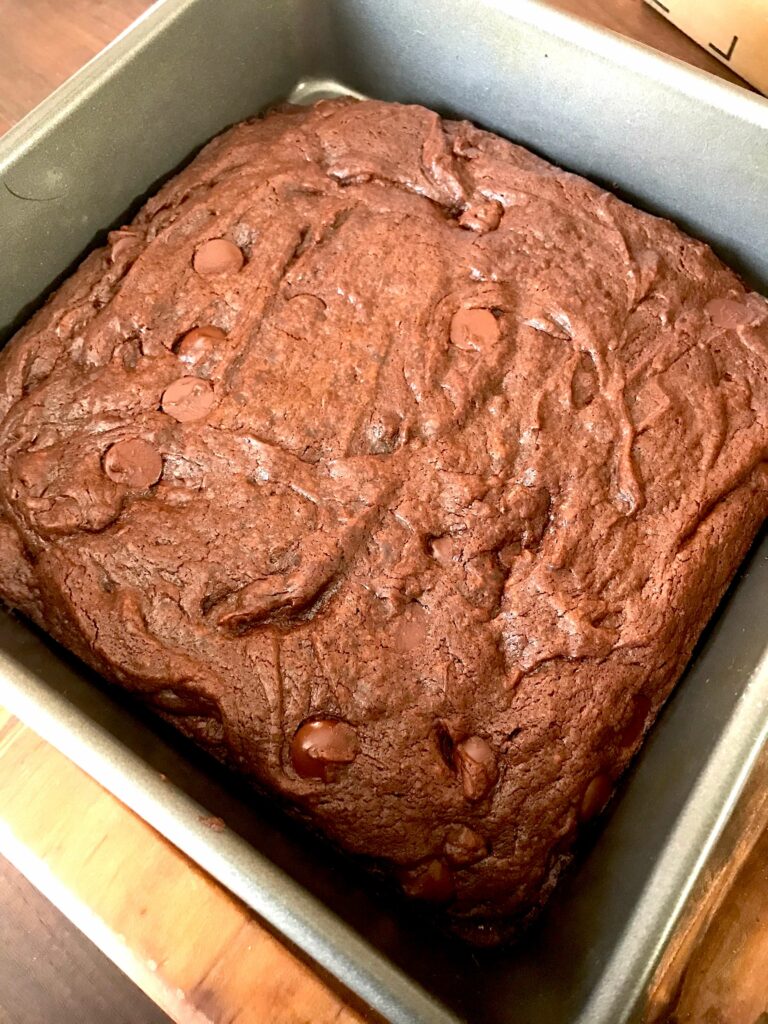


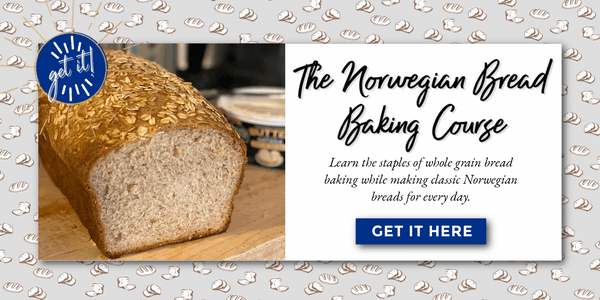
I loved reading about Norwegians’ love of chocolate. Have you written about licorice? I live in Washington state and when I visit our “little Norway” (Poulsbo) I go to a small store, Marina Market, where I can buy black licorice caramels. They carry numerous types of black licorice candies that are imported. I would be really interested in reading about the Norwegian relationship with black licorice. Thank you.
Nice history of chocolate in Norway! When I lived in Norway, I was amazed at Norwegians love of Marzipan. It must be right up there with chocolate!
Great history lesson on Norway and chocolate. Thanks for sharing!
Loved your post and will share with hubby about how Norwegians love milk chocolate. He’s from Scandinavian descent but prefers dark chocolate. I LOVE milk chocolate. We’ve also been to Poulsbo as we have friends that live near there.